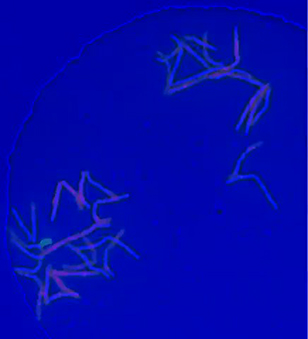
Active | Genetically identical mycobacteria respond differently to antibiotic 25752Antibiotic resistance in microbes is a serious health concern. So researchers have turned their attention to how bacteria undo the action of some antibiotics. Here, scientists set out to find the conditions that help individual bacterial cells survive in the presence of the antibiotic rifampicin. The research team used Mycobacterium smegmatis, a more harmless relative of Mycobacterium tuberculosis, which infects the lung and other organs to cause serious disease.
In this video, genetically identical mycobacteria are growing in a miniature growth chamber called a microfluidic chamber. Using live imaging, the researchers found that individual mycobacteria will respond differently to the antibiotic, depending on the growth stage and other timing factors. The researchers used genetic tagging with green fluorescent protein to distinguish cells that can resist rifampicin and those that cannot. With this gene tag, cells tolerant of the antibiotic light up in green and those that are susceptible in violet, enabling the team to monitor the cells' responses in real time.
To learn more about how the researchers studied antibiotic resistance in mycobacteria, see this news release from Tufts University. Related to image 5751. | | Public Note | | | | | Internal Note | | From: Bree Aldridge [Bree.Aldridge@tufts.edu]
Wednesday, July 06, 2016 2:34 PM
Dear Dr. Spiering,
Thank you! I'd be very happy to have our work highlighted in the gallery. Please find the images attached.
Best,
Bree
From: Spiering, Martin (NIH/NIGMS) [C]
To: bree.aldridge@tufts.edu
Wednesday, July 06, 2016 7:43 AM
Dear Dr. Aldridge,
I am a writer and editor with the Office of Communication and Public Liaison at the National Institute of General Medical Sciences. I'm reaching out to you because we noticed your intriguing image and video of growing mycobacteria in a recent news release (at http://now.tufts.edu/news-releases/individual-mycobacteria-respond-differently-antibiotics-based-growth-and-timing ) highlighting your work. We're interested in including both into our image gallery (at https://images.nigms.nih.gov/) to bring your work to broader public attention.
Images and videos in the NIGMS image gallery highlight NIGMS-funded work and are made available to the public for educational uses, provided that users credit the creator, i.e., you, for this work. Would you let us feature your work in this way? If so, could you send me the video file and a high-resolution file of the still image?
Please let me know if you have any questions or concerns. I look forward to hearing from you.
Thank you,
Martin J Spiering, PhD, ELS
Writer & Editor (contractor)
OCPL, National Institutes of Health/NIGMS
| | | Keywords | | antibiotic
rifampicin
Mycobacterium | | | Source | | Bree Aldridge, Tufts University | | | Date | | | | | Credit Line | | Bree Aldridge, Tufts University | | | Investigator | | Bree Aldridge, Tufts University | | | Record Type | | Video | | | Topic Area(s) | | ;#Cells;#Chemistry, Biochemistry, and Pharmacology;#Genes;# | | | Previous Uses | | | | | Status | | Active | |
| | View All Properties | | Edit Properties |
|
